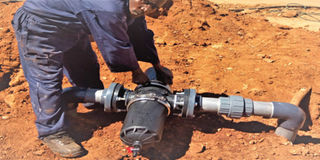Your agro clinic: Filtration in irrigation

Irrigation water does not always come from clean sources and hence filtration is essential. PHOTO | COURTESY
What you need to know:
- Filtration is important and should be chosen wisely.
- The right selection of a filter can extend the lifespan of an irrigation system.
- Most farmers use river, lake or earth reservoir for irrigation.
- Small scale farmers use two types of systems, which can be cleaned manually.
All including drip lines, button or arrow drippers, fogger or misting, sprinklers and others should have an efficient filtration system.
Filtration is important and should be chosen wisely. The right selection of a filter can extend the lifespan of an irrigation system.
For example, to irrigate drip field without filter unit can clog lines within three weeks, resulting in dead plants.
Irrigation water does not always come from clean sources.
Most farmers use river, lake or earth reservoir for irrigation.
Apart from sand particles, it also has organic matters like algae. These can stop water from flowing.
Even clean borehole water can grow different species of algae when stored. Always check your tanks.
There are many types of filtration systems. They include multimedia or sand filter and automatic flushing filter.
Small scale farmers use two types of systems, which can be cleaned manually.
Screen filter is most common type. It has stainless steel wire mesh element in the PVC body. It is mostly used with clean water.
Disc filter is more effective with water from rivers, lakes or reservoirs.
It is made from PVC material. Circular rings are stacked on one another.
Every ring has micro fenced paths, where water has to pass through.
Sand or organic particles don’t find their way out to irrigation system.
Regular cleaning is necessary.





